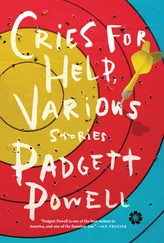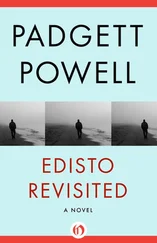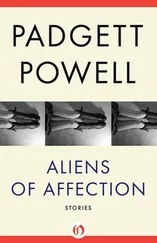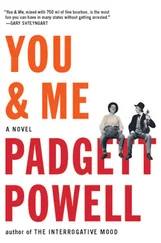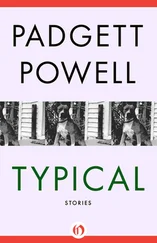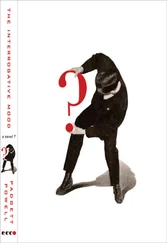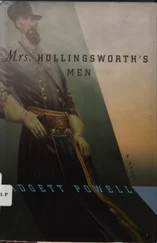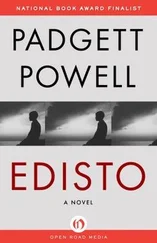Memaw did not become Memaw until she allowed herself to be linked to Pawpaw via a civil ceremony during the postwar frenzy of imprudent coupling that wrought more harm to the country, she now thinks, than Hirohito. She had a normal name and was normal herself. She was Sally, and a fond uncle had called her Salamander, which now, against Memaw, sounds charming. And Pawpaw had been Henry Stiles until two minutes after the ceremony, when people seemed to come out of the woods and the woodwork all calling him Pawpaw and her nothing, ignoring her for a full two years, it seems, until slowly addressing her, tentatively at first but then unerringly, as Memaw. She was powerless to stop this phenomenon; it was not unlike a slow, rising tide, unnoticed until it is too late to escape. There she had been, first on a wide isolated silent mudflat of wedding-gift Tupperware and their VFW mortgage, and then in a sudden full sea of Memaw and only a thin horizon of sky and water around her. It stunned her to hear “Memaw makes the best cornpone,” stunned her into hearing it again and again, and then Sally was never heard of or from, and she was not a Salamander but a Hellbender.
We have it from the army of private authority that dogs love Memaw. Two dogs are, in fact, at her heels as she herself dogs the heels of the mule, of which dogging she is tiring, and Pawpaw, who dropped his pipe and voluntarily quit the mule to retrieve it, having grown complacent with his surmise that his pipe is unhurt, is in an awkward amalgam of embarrassment and fatigue and uncertainty as to what to do now. Memaw is between him and his burning getaway mule, and he is more winded than Memaw and the mule, so that the matter of his skirting around Memaw and overtaking the mule himself is out of the question. He is somewhat concerned — even the innocent witness can deduce this, by the nervous motions of his feet when she turns occasionally to glare at him and point one long finger at him — that Memaw will desist pursuit of the burning mule and come after him, which will put him in the face-losing position of having to retreat.
Keeping his distance, as he is, he has had occasion to pick up pieces of charred currency and an envelope with a canceled stamp on it dated 1943, which he knows was the war because he knows (first to bloom in his troubled brain at this moment, this is to say) of the 1943 steel penny, a copper-conservation thing owing to the war, which he knows (second to bloom) he was in, which he knows (third) because he won it. The letter is addressed to Sally Palmer in a handwriting not his own.
This was the best grocery list Mrs. Hollingsworth had ever conceived. There were things on it that obviously suggested you need not go to the store only to be disappointed over not getting them. She sat at her table marveling at the fun of such a grocery list. She was going to make a few of these. Yessireebob, she said to herself, slapping at a fly. This was a bit more like it. She studied for a moment her linoleum floor, which had a nice old agate speckle to it and made a sound like something breaking when you walked on it.
MRS. HOLLINGSWORTH HAD READ or heard some things about Nathan Bedford Forrest. She had to have. It was the name of the high school. Had she read of him as well? The idea had formed in her mind that he had been indomitable; he had been the War’s Achilles. Achilles with pinworms and slaves besmirching his heroic profile. Had she heard even that the South could have won had he been given broader command? He seemed listable.
She put him on:
A man who has seen Forrest catches two bluegills at one time on his hook, on his cane pole, noticing as he does, inexplicably, an exotic fish — parrotfish? yellowtail? — in the water. The fish is as odd as his vision of the Civil War figure: a strange waking dream of a man on a horse larger and louder than Hollywood, whom he somehow knew to be representing Nathan Bedford Forrest. In the same spirit of unblinking improbability he saw what looked like a pompano in the dark lake, now the two bluegills. He enters the dockhouse to show the improbable catch to his wife. In the dim shack he sees a leg in tight polyester shorts hanging awkwardly off a cot, and as the party wakes up he realizes the leg is not his wife’s. “Excuse me, sir — ma’am,” he says to a fogged woman who looks like his father’s sister a bit, but more bleached. He intends to explain everything, including how and why a man up to something, as it appears a man this close to a strange woman sleeping must be, would not loom over her like this with two fish on a pole. Only an honest bumbler would do that. Why this woman is where his wife should be, and in a drunken stupor, he cannot begin to decide. He says to her, holding forth the two fish as she begins to focus on him for an explanation of his intrusion, “The escapees of the hattism of dived-in-ness.” By “hattism of dived-in-ness” he seems to mean regularity of conformity.
The man was named Lonnie Sipple before he forgot who he was because of his broken heart.
— DO YOU SEE OUR leader with his hair on fire riding like—
— No.
— the wind?
— I didn’t even see that he was on a horse.
— You’d better get with it, then. If your leader rides by with his hair on fire slapping at you with the flat of his saber so as to inspire you or goad you or outright scare you to heroics beyond yourself, and taking up falterers by the collar and throwing them to constitute roadblocks before other falterers, and otherwise threatening them with sufficient otherworldly gesture that they become convinced simple mortality is less dreadful than what he promises them if they run, and so they decide to turn and fight, and thank him later, whether they are dead or alive — if you do not see this going on about you, you are in trouble.
— I did not see “my leader.” I am not aware that I am being led. Or that I follow.
— Then you are in deep, deep trouble, my friend. I should take this can of Ronson here — who bought this? for what? very pretty can — and set your hair on fire.
— Maybe you should.
— This can reminds me of a bad high school football uniform, the loud blue-and-yellow combo. Hard to win in that rig.
— Red-and-black beats that every time.
— There’s Forrest again!
— Where?
— Right there!
— I can’t see him.
— It is true, then. Some people see him, and some do not.
— I’d just as soon not.
— Frankly, I do not know that you are wrong. Because I do not know what to do with myself when I have seen him ride through a town square, horse and hair aflame, salt and leather and sweat and steel penetrating the trailing air, and a malaise of sadness and loss consuming all witness to him, leaving us diffident and afraid and idle in his wake.
— Maybe you should shoot him.
— The bullet would tink off him like a piece of errant solder. It would lie molten and deformed, splashed in the dirt. One side of it would shine and the other would be dulled by annealed dirt. It would be a symbol. Of something.
— Indeed. But what?
— I would not know. I failed Symbol.
— I failed Meta-everything.
— High five to that! But still, I can see Forrest, and you cannot.
— You have not failed Forrest.
— No, I have not. I will not fail Forrest. Forrest was made so that a man, even a confused one, a little afraid, or a lot, might not fail him, and thereby might not fail himself.
— He sounds like Jesus, sort of. But I failed Jesus too.
— Let’s not get into that. This is enough: a man whose head and horse are on fire storms through town squares under my minute inspection. He is either there, invisible to the townsfolk his passing would otherwise knock down or blow down, or only there in my perhaps specially tuned vision. To me it does not matter how he exists, or why. I see him, he leads, I follow. Sometimes that means I go into the closest café on the square and have coffee. But I do what I can do. Even the terms of society are clear in a café after Forrest passes. The waitress in white or light green is tired but polite. The drunk is at the counter. The regulars are at their table, sclerotic and suspendered, gouty and flushed and content. And I am I, on my Mars, dithered even by the choices on a country breakfast menu, so all I have is coffee. But I have seen Forrest. I am not doing badly.
Читать дальше

